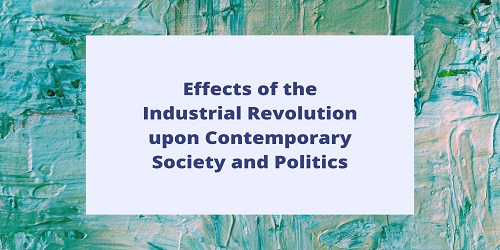Effects of the Industrial Revolution upon Contemporary Society and Politics:
“The Industrial Revolution opened the way to a new world.” With the increase of production in land and industry population grew rapidly. Most of the population growth was centered in cities which assumed importance with the establishment of factories. By 1851 half of England’s population had become urban. With the rise of the cities, important changes occurred in the structure of society. The familiar division of landowner and peasant, merchant and artisan continued. But new classes like industrial capitalists and wage-earning proletarians emerged. The Industrial Revolution made capitalists the supreme masters of industry. The wage-earning proletarian was wholly dependent. Along with the fear of unemployment, the new proletariat lived in abject poverty. Though in 1925 the workers were permitted to form unions by the Parliament, the latter forbade them to organize strikes.
The dismal condition of workers created by industrialization produced sharp reactions among thoughtful men. A humanitarian factory owner Robert Owner upheld the view that the capitalists should share a portion of their profits with his employees. The French aristocrat, St. Simon advocated that the State should assume control of production and distribution. Charles Fourier, another Frenchman pleaded for a new social organization based on cooperative communities. But a more practical socialist was the Frenchman, Loius Blanc who preached that everyone should be remunerated according to his needs. Another Frenchman, Proudhon wanted to abolish private ownership of property. But the greatest advocates of Socialism were Karl Marx (1818-1883) and Friedrich Engels (1820-95). For Marx and Engels history was a struggle between classes, especially between the upper middle classes (bourgeoisie) and the proletariat. In The Communist Manifesto (1847) Marx made a fervent appeal to the workers of the world to unite.
In England, the State began to interfere for the better protection of the working class. Bismarck’s State Socialism found general acceptance in Europe. Though the new policy of the State hardly realized the ideas of the proletariat, it marked a step forward to meet the claims of that class.
The Industrial Revolution brought about a change in the political life of England. The House of Commons was elected on a narrow franchise and undemocratic system. A movement for reform in the House of Commons began. The First Reform Act of 1832 granted the Industrial bourgeoisie a voice in the Parliament through it did not confer the franchise on the laborer. The Reform Act of 1867 nearly enfranchised all the working men in the towns. In 1884 the franchise was extended to agricultural laborers. In 1901 the British working men organized the Labor Party.
The influence of the Industrial Revolution was felt in British foreign policy. She was anxious to find new markets for her ever-increasing volume of trade as well as to secure raw materials for industries. The Industrial Revolution was a revolution in consumption as well as production. Larger production necessitated large consumption.
The Industrial Revolution gave a great impetus to Nationalism. If nationalism was intensified, so was internationalism. The vast international trade that grew up as a result of the Industrial Revolution led the various nations to unite into a common economic life.
The Industrial Revolution enabled the European power to establish economic control over Asia and Africa. Apart from providing raw materials to the European powers, these countries become the scene of international conflict. There was Anglo-French rivalry in Asia and Africa, Anglo-Russian rivalry in Central Asia, and Franco-Italian, and Franco-German rivalry in Africa. As major power rivalries became tense, military expenditure rose. These developments climaxed in the year 1914. The disciples of Adam Smith had not visualized industrial warfare.
The Industrial Revolution was a growing process; it did not stop abruptly in the middle of the 19th century. Thus the steam engine was followed by the turbine, the gasoline engine, and the electric motor. Human endeavor and scientific discipline enabled men to establish the telegraph, the telephone, radio, television, and space technology. The Industrial Revolution heralded the dawn of a new era- an era marked by man’s bold mastery over the forces of nature.
The Industrial Revolution bequeathed us many problems- problems which were many, formidable, and dressing. As a recent writer has observed:
“The Industrial Revolution has invaded the world, turned our very existence upside down, and overthrown the structure of all existing human societies in the course of only eight generations. And today it is beginning to press with great urgency new problems of such enormity that the human mind can hardly grasp them- the uncontrolled increase in population, the hydrogen bomb; the pollution of the atmosphere; the destruction of the natural surroundings by industrial waste….the breaking up of the traditional state; the scientific organization of uncontrolled centers of power….Under the weight of these problems, the old structures crumble….Everyone has been taken by surprise.”









Comments (No)